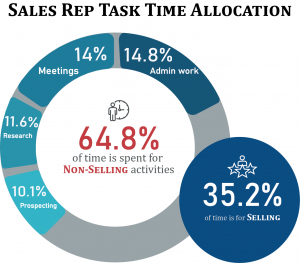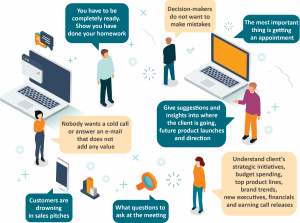We spoke to over 100 sales executives, and they all had this to say: “Enterprise sales are getting harder and harder”. With all the new tools at our disposal (some of us here at ENKI have backgrounds in B2B) and more channels than ever to reach prospects, you’d think enterprise selling would be easier than ever.
Well, not so much. Since everyone has something to sell, and since reaching someone is easier than ever, potential buyers are finding themselves short on attention to give.
Getting the first meeting is hard, and the modern buyer is difficult: they want to know right away that you’ve done your homework, and they want to see that you understand their problems.
For complex B2B solution sellers, this translates into large amounts of research, which brings us to our first point.
No Time To Sell
According to a survey of 700 Sales reps, only 35.2% of your average rep’s time is spent actually selling. For those in the know, selling does indeed require preparation, which takes the form of admin work, internal meetings, and research. For companies with large product portfolios and companies with highly customizable and complex solutions, enormous amounts of time can be spent in training. And that’s normal, the modern solution buyer is technical, and therefore sales reps should make an effort to speak their language.

We therefore asked reps about their prospecting phase (prior to reaching out), and it turns out that the amount of time spent on this varies from 3 hours up to 3 weeks. And at this stage, we hadn’t delved into the quality of their research, with many reps confessing that they often don’t feel entirely ready for client meetings.
In truth, you’re never really ready. How you manage that, however, is down to the art of selling, training and experience. But in today’s fast-paced, unforgiving, noisy world, we think there should be a way for B2B reps to cut down on research time and get their message across.
Changing Expectations
Forrester reports that 74% of companies want to be data-driven, but that only 29% of them can leverage it effectively. This isn’t surprising because actionable insights only really are actionable (i.e. data-driven) if someone does use them. In other words, it is not enough to have a sales rep and tons of great prospect research. Not only does the rep need time to be able to reach out (an overtime 8 PM cold call is, in the least, inadvisable), but the pitch needs tailoring to the offer. It seems pretty self-evident, but in practice it isn’t really so. Actionable insights require good research – and that’s hard to replicate for every single prospect.
In addition, not only is obtaining such info difficult, but so is its standardization. Research skills are essential and valuable, but humans can only do so much at scale. That’s why search interest on Google for “sales enablement’” has increased 61.1% since last year.
Prospects simply no longer want a one-size fits all pitch.
Can’t Get An Appointment
It’s not a big secret that C-suite executives are difficult to reach. Unless an inner champion sponsors your meeting, there’s a high chance that you won’t get their attention in the early stages of the sale.
The reality is that in the modern day, a solid B2B deal begins with the people directly affected by your solution, people which often sit at mid-level. A solid understanding of their problems would yield a much better conversion rate than a C-target strategy.
Once you do get there however, Nancy Duarte’s Selling to the C-Suite: Why Executives Disengage is a great read to remind ourselves of the key metrics a rep needs to hit to capture attention.
Many of the Reps we interviewed agreed with this challenge, and so do Bay Area CEOs:
“The most important thing is getting an appointment. Getting the first meeting with key people is more important than ever. When you are in a meeting, you only have one hour to make a first impression in the first meeting, and you do not have a second chance.”
Conclusion
Enterprise and B2B sales seem to be at a crossroads where marketing automation and LinkedIn role-targeting haven’t entirely reconciled with the expectations of modern buyers.
Here, at ENKI, we believe in the saying that ‘people buy from people’. The human element is crucial in selling, and this could translate into two different futures for B2B sales. The first is one where sales become consultative and technical, but very low-volume: companies will need more reps and more training to carry increasingly complex sale cycles. The second one (which we prefer) would be one where reps are just as well-trained but can remain focused what they were hired to do: selling. This would be achievable by devising ways to cut down on non-selling activities whilst enabling better prospect approach tailoring.
And so, here at ENKI we’re building research tools for better prospecting, in the hopes that B2B selling won’t have to be so grueling forever.
Let us know what you think below.
Alternatively, drop an email erhan at enkiai.com.


